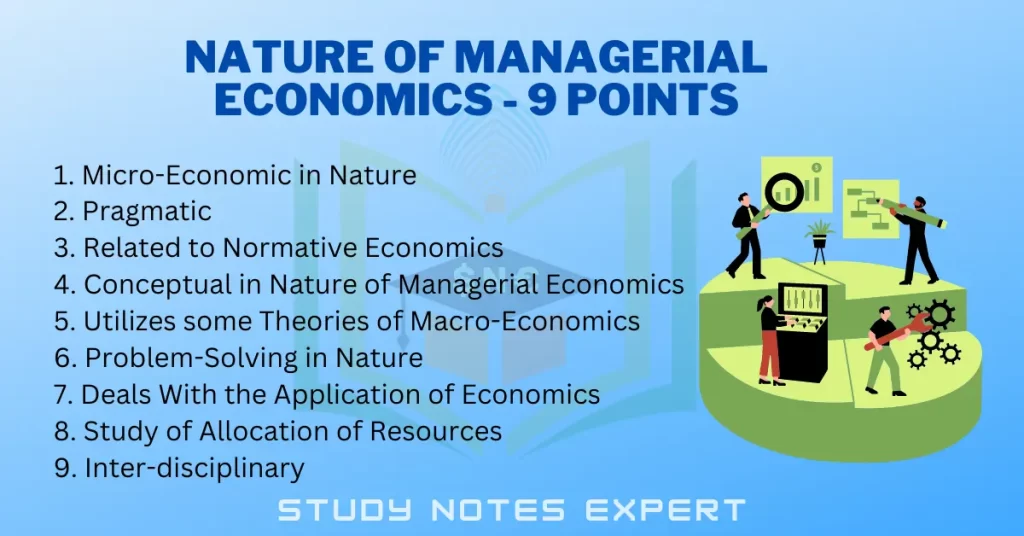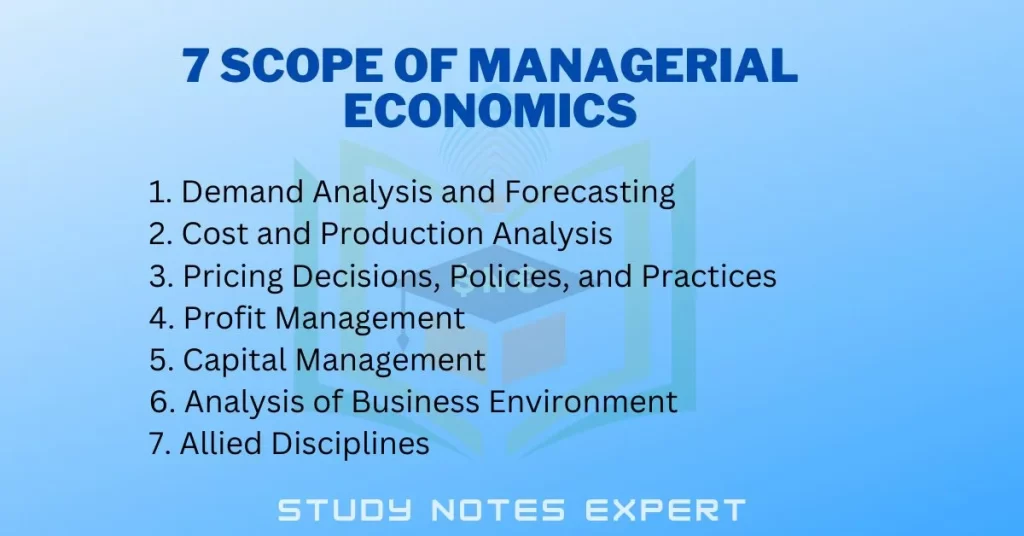Managerial Economics is a good combination of economic principles with business practice. To know more about it, you need to understand the nature of managerial economics and its scope of managerial economics. After that, you can do better to conclude things. To know more detailed information, read this blog till to the end.
The synthesis of economic theory with business practice is known as Managerial economics. Various tools which are provided by economics are applied to business management. Alternatively, the application of economic theory to the problems of management is referred to as managerial economics. The solving of problems at the level of the firm by applying economics is known as managerial economics. The business executive is capable of assuming and analyzing managerial economics of things and thus profit maximization is the emphasis of economics resulting in getting satisfactory profits.
Definition of Managerial Economics
Words of Spencer and Siegelman, ”Managerial Economics is the integration of economic principle with business practice for the reason of facilitating choice-making and forward making plans by way of control”.
Words of Jeal Dean, “The purpose of managerial economics is to how economic analysis can be used in formulating policies”.
Words of Mansfield, “Managerial Economics is worried about the application of monetary concepts and financial evaluation to the problems of formulating rational managerial decisions”.
Managerial economics is a venture to use economics and economic logic in formulating the policies of the business. Thus, managerial economics is that form of economic knowledge which is used in the analysis of business problems for taking the relevant business decisions and devising forward plans.
Effective Nature of Managerial Economics
These are some points that belong to the nature of managerial economics category.

1. Micro-Economic in Nature
The branch of economics that deals with individual units of an economy is called microeconomics. These individual units may be either a firm or a person or a group of firms or group persons.
2. Pragmatic
Managerial economics is practical in nature. Rigid and abstract theoretical frameworks are provided by managerial economics to managers. It is said to be pragmatic in nature because it avoids complex abstract issues of economic theories at one end, while at another end it incorporates complications which is ignored by economic theory in order to analyze the overall situation where managerial decisions are to be taken.
3. Related to Normative Economics
Economics can also be classified as positive or normative. Positive economics states the economic phenomenon that is observed and normative economics determines what should be done which means discriminating the ideal from the actual.
4. Conceptual in Nature of Managerial Economics
Managerial Economics is based on the solid conceptual foundation of economics. The subject matter of managerial economics is not irrational. Analysis of business problems on the basis of established concepts is the objective of managerial economics.
5. Utilizes some Theories of Macro-Economics
Macroeconomics envisages all the individual matters that are integrated to be part of the analysis of the problems. of the economy. as of a nation not pertaining to an individual that is operated in the environment affects and gets affected. Thus, the majority of the aspects that are related in such a manner become the subject matter of microeconomics.
6. Problem-Solving in Nature
Managerial economics not only analyses the managerial problems of business units but it aims to resolve the business problems also which provides optimal solutions. Hence, it is problem-solving in nature.
7. Managerial Economics Deals With the Application of Economics
Managerial economics studies and deals with economic theories that are applied to business management. The relevant aspects Of economic production, markets, etc., must be carefully understood by the managers which facilitates them to manage the business in an organized manner by applying the principles of economics in making managerial decisions.
- Demand Analysis: It includes Laws of demand elasticity of demand, determinants of demand, etc.
- Production Analysis: It includes Laws of variable proportions, laws of returns to scale, economies and diseconomies of scale, etc.
- Market Analysis: It includes the nature of the product market like perfect competition, monopoly, oligopoly, and monopolistic competition. Product pricing and output decisions in different forms of market etc.
8. Managerial Economics is the Study of Allocation of Resources
Proper allocation of resources is fundamental in managing the business. The theory. of economics deals such as what to produce, how to produce, and for whom to produce. Thus, the theory of economics, which is fundamental to managerial economics, specifies the significance of the allocation of resources to the application of the principles of managerial economics.
9. Inter-disciplinary
Managerial economics being a new discipline is the integrated form of multi-discipline. Its techniques, tools theories, and contents emerge from different subjects, such as Economics, Management, Statistics, Accountancy, ‘Sociology, and Psychology. These are the crucial nature of managerial economics.
Additionally, the Microsoft certification test is aimed at the Messaging Administrators. These professionals are able to perform the administration, troubleshooting, and monitoring tasks, which target recipients, public folders, mail flow, and permissions. So, there is a very helpful program that is Exam-Labs Microsoft MS-202 and you can prepare with Microsoft MS-202 Microsoft 365 Messaging Administrator Certification Transition exam dumps questions and answers.
Major 7 Scope of Managerial Economics
These are the scope of managerial economics and follow the following points in the below section:

1. Demand Analysis and Forecasting
A business firm is transforming productive resources into goods that are sold in the market. Accurate estimation of demand is an important basis of managerial decisions sales facilitates management for scheduling the production and employing resources. It will be helpful for management to maintain or strengthen its market position and profit base.
2. Cost and Production Analysis
Cost estimation is very useful for taking management decisions and various factors which affects the cost estimation should be given due consideration for planning purpose. Cost and production analysis includes various concepts such as cost concepts and classifications, cost output relationships, economies and diseconomies of scale, and production.
3. Pricing Decision, Policies, and Practices
Price gives income to the firm and it constitutes the most important field of managerial economics. It covers various concepts such as price determination in various pricing policies, pricing methods, differential pricing, productive, and price forecasting. In these things, there is a huge scope of managerial economics.
4. Profit Management
Earning maximum profit is the main objective of a business firm. Due to variation in costs and revenue, an element of uncertainty about profits always exist. It covers various aspects such as the nature and measurement of profit, profit policies, and techniques of profit planning like break-even analysis.
5. Capital Management
For any firm, the most complex problem is the firm’s capital investments. Capital management implies planning and control of capital expenditure because it involves a large sum and moreover the problems in disposing of the capital assets are so complex that they require considerable time and labor.
6. Analysis of Business Environment
The working and performance of any business firm are affected by me various environmental factors. Therefore, in the decision-making process by the managers. If the manager does not consider the environmental factors then it will be harmful to the firm. Therefore, they must be aware of the economic environment, particularly those economic factors which create the business climate.
7. Allied Disciplines
The concepts which are helpful for the management in decision-making are in nature. Therefore, for determining the relationship between economic variables, mathematical tools are generally used. The linear programming technique is used by economic firms to maximize or minimize their objective function Similarly, for taking business decisions, statistical and accounting principles are used.
What are the 5 Scopes of Managerial Economics?
The five scopes of managerial economics are:
1. Business economics
2. Managerial economics
3. Microeconomics
4. Macroeconomics
5. International economics
What is the Scope of Economics in Business?
The scope of economics in business is quite vast. It includes market analysis, business decision-making, and resource allocation. Economics also plays a role in business strategy and planning. Additionally, economics can help businesses understand and predict consumer behavior.
What are the Natures of Economics?
The natures of economics are:
1. Allocation of resources
2. Production of goods and services
3. Distribution of goods and services
4. Consumption of goods and services
5. Exchange of goods and services
6. Pricing of goods and services


I’ve recommended your website to all my colleagues – it’s that good!
I am really enjoying by these.